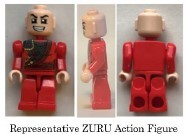LEGO Blocks Out ZURU in Copyright Dispute Over Minifigures
September 16, 2020
Authored and Edited by Rosie Norwood-Kelly; Margaret A. Esquenet
From jungle tree houses and fire planes to Hogwarts Castle and the Death Star, LEGO’s interlocking blocks sets are beloved by kids of all ages. Earlier this year, the Federal Circuit held that Lego’s copyrighted and “most iconic” minifigure figurines, a staple in any LEGO collection, had been infringed by ZURU Inc.’s action figures. In doing so, it affirmed the district court’s preliminary injunction against ZURU preventing it from distributing and selling the infringing figurines. However, with regard to ZURU’s other toy products, the court disagreed with the lower court’s finding that LEGO had shown a likelihood of irreparable harm and vacated the injunctions.
In October 2018, ZURU, Inc. began selling its line of Action Figures, Max Build More Bricks, and Mayka Toy Tape throughout the United States at Walmart, both in-store and online. In response, LEGO sent multiple requests to ZURU to cease and desist from the sale and distribution of the toys. When the requests were refused, LEGO brought suit alleging that ZURU’s figurines and bricks infringed on its registered copyrights, trademarks, and design patents and sought a temporary restraining order and preliminary injunction. The district court granted LEGO’s requests and, because the cases included patent claims, ZURU appealed to the Federal Circuit.
First addressing the allegedly infringing action figures, ZURU argued that the district court's analysis of LEGO's likelihood of success on its copyright claim was flawed because it relied on comparisons of the ZURU Action Figures to LEGO Minifigures instead of to LEGO’s copyright registration images. Second, ZURU argued that if the district court's approach was acceptable, its findings were erroneous because of the differences between the ZURU Action Figure and LEGO Minifigures. The two figurines at issue are shown below:
 |
 |
The court rejected both arguments. First, it found that the comparison between the figurines was appropriate because the Lego Minifigure was the physical embodiment of the copyrighted images, not, as ZURU contended, an unregistered derivative work of the copyrighted images. Second, the court determined that when analyzing substantial similarity, it is not appropriate under Second Circuit precedent to consider the specific differences between the two figures as ZURU had argued. Rather, the court stated “[t]he standard test for substantial similarity between two items is whether an ordinary observer, unless he set out to detect the disparities, would be disposed to overlook them, and regard [the] aesthetic appeal as the same." Because ZURU failed to show that the “total concept and feel” of the two figurines was different, the court upheld the district court’s finding on substantial similarity.
Additionally, relying on the district court’s court finding that the “construction toy market [was] highly competitive” and social media evidence that ZURU’s action figures were of lesser quality, the court determined irreparable harm was likely. Lastly, the court agreed with the district court that any of ZURU’s potential injuries would result “solely from its own deliberate acts of infringement” and that this weighed in favor of granting the preliminary injunction.
The court next addressed the injunction granted based on the claim that ZURU’s Max Build More Blocks infringed Lego’s design patents. ZURU took issue with the district court’s finding that Lego would suffer irreparable harm if an injunction was not granted. At oral argument, LEGO argued that it would suffer a loss of goodwill and brand equity because of the inferior quality of the ZURU Bricks’ “clutch power,” or ability to remain stuck together. However, because LEGO conceded that there was no actual or potential loss of market share, the court held that the district court abused its discretion in granting the injunction against the sale and distribution of the ZURU Bricks.
Finally, the court addressed the injunction against the sale and distribution of ZURU’s Mayka Toy Tape. Although it found the district court’s decision that ZURU’s tape packaging infringed Lego’s copyright was supported by the “substantial similarity” test, the court determined there was no support for a finding of irreparable harm. LEGO failed to present evidence that it would lose goodwill or reputation and admitted that there was no evidence the tape product was inferior in quality. This, in addition to the fact that LEGO does not sell a similar product, led the court to find the district court abused its discretion in issuing the injunction against ZURU’s Mayka Toy Block Tape packaging.
The case is LEGO v. ZURU Inc., 799 F. App'x 823 (Fed. Cir. 2020)
Related Practices
Related Industries
Related Offices
Copyright © 2020 Finnegan, Henderson, Farabow, Garrett & Dunner, LLP.
DISCLAIMER: Although we wish to hear from you, information exchanged in this blog cannot and does not create an attorney-client relationship. Please do not post any information that you consider to be personal or confidential. If you wish for Finnegan, Henderson, Farabow, Garrett & Dunner, LLP to consider representing you, in order to establish an attorney-client relationship you must first enter a written representation agreement with Finnegan. Contact us for additional information. One of our lawyers will be happy to discuss the possibility of representation with you. Additional disclaimer information.


